Technician Episode 01
A superior technician feels what each and every customer expects
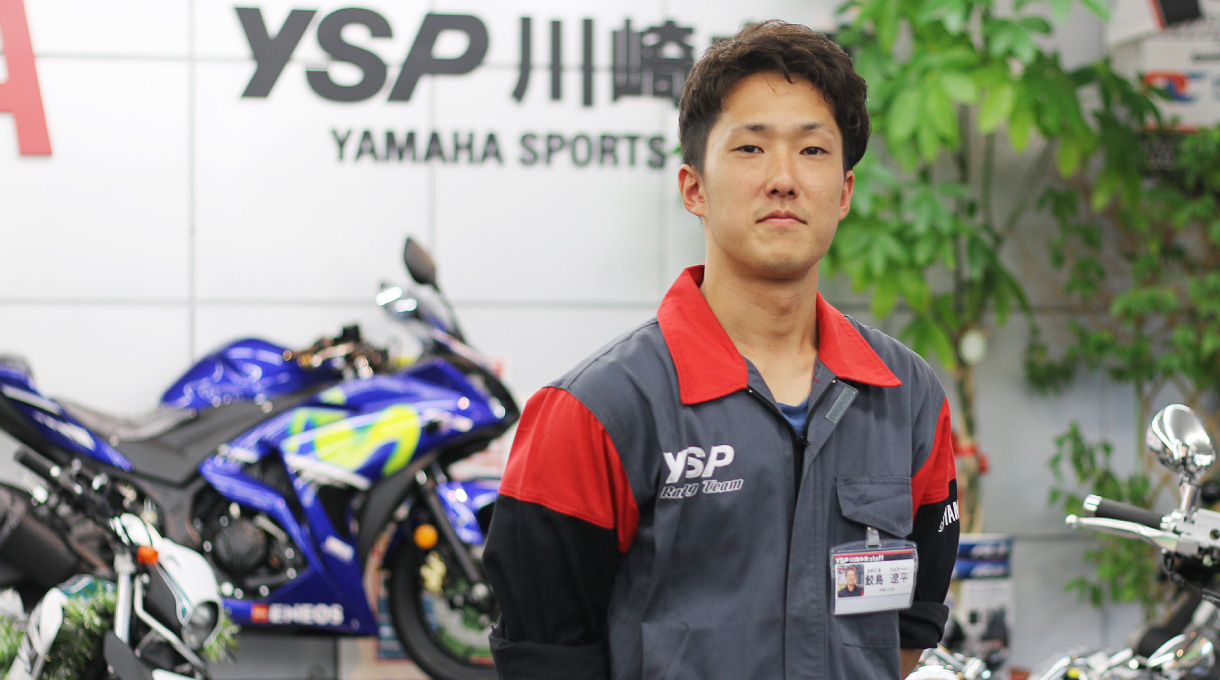

Episode 01
Ryohei Samejima
WTGP2016 Sports model class Champion
PROFILE
- Hometown: Kanagawa, Japan
- Dealer: YSP Kawasaki Chuo
A young up and coming mechanic who works at the YSP Kawasaki Chuo, he is not only reliable and fully self-confident but really puts a lot of effort into whatever he does. At the WTGP in 2016, he figured that “I'm only showing about 80% of my ability during actual competition so this time I'll make a 120% effort” in the competition and did spectacular, ranking at the top among 33,000 competitors.
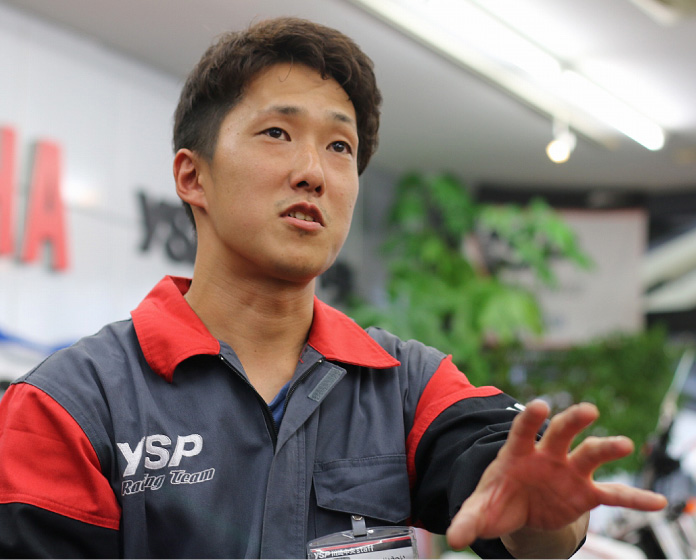
Getting started as a technician
Actually I never had much interest in motorcycles until I was a high school student. There were two triggers that spurred my interest. One was that a friend that got a medium-size motorcycle license at that time. I was just riding to school on a 50cc moped at the time and just thought motorcycles would be fun. Another push which was kind of interesting was from a free gift that came with canned coffee I got on my way from school. It was a small plastic model of bike from Yamaha's old motorcycle series. The model I got was the famous RZ bike from the 1980's. It was love at first sight since I had never seen such a cool looking bike. I somehow wanted to start riding motorcycles because of my friend but this desire suddenly changed all at once to “I want to ride the RZ.” However, the RZ at that time was already 20 years old and was getting ancient. The people around me gave advice and eventually I chose “R1-Z” which was a follow-up model to the RZ.
After that, I ran around everywhere on my motorcycle all day and all night and all I could think about was motorcycles. However, at the time I was only interested in them as a rider, and never thought of becoming a technician. My relationship with the shop where I bought this R1-Z got me started on the road to becoming a technician.
This shop was kind of unusual in that it only handled medium-sized motorcycles. The shop opened in the evening and closed at dawn. It was a shop where the regulars were always hanging out and I was one of them. Eventually, I borrowed tools and began doing service work in a corner of the shop. If it was a minor repair of a customer's bike I helped in any way I could and eventually got handed the key to the bike shop (laugh). My interest in bikes all started at first sight of the RZ style and before I knew it I had become a technician. That is my true career record.
Favorite repair work
Because liking motorcycles was the reason I became a technician it is only natural that I also enjoy handling motorcycles. I often get asked what my favorite repair work is and what repairs I am best at but I try not get absorbed personally in those kinds of thoughts. A senior technician once told me, “Whatever the repair work, don't start feeling that you don't like some task or aren't good at it” and I never forgot those words. You never know what kind of work you will have to do as a technician. Some of it is just sticky, oily, dirty work but there are also very difficult types of work. If you even start to just think for a little bit that “I don't like this” it makes you more aware that it is difficult job. I think being highly motivated to perform service work is extremely important when handling the customer's beloved motorcycle no matter what the particular repair job you face.
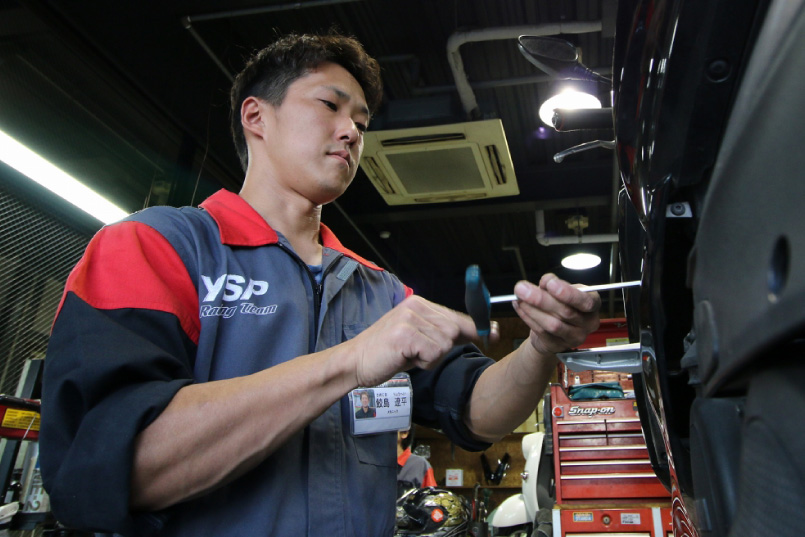
The moment I realized I love my job
Now that I think about it I remember one incident. A guy who bought a motorcycle for a cheap price at an Internet auction came by our shop. It turned out that the day after he bought the motorcycle it stopped running because the battery died. The shop where he purchased it claimed not to know anything about it and not knowing what else to do he came to our shop. There was a problem with the charging system, but because the vehicle was an old model there were no parts in stock. He still insisted he wanted it fixed so I figured out a way to repair the vehicle by using old parts and repairing the wiring and whatever else I could do. The customer was really happy even though it took nearly half the price at which he purchased the bike to fix it. He said, “You guys were so nice to me next time I'll purchase a motorcycle from an authorized dealer like yours.” This was a great moment for me since the customer showed how pleased he was with how we took care of him.
Our work also involves an aspect wherein we not only do service work but also provide it at a price equivalent to the safety we provide. Some people may ask why an oil change at our shop costs more than other shops. But an oil change at our shop means lifting the vehicle, checking the surrounding parts while doing reliable service work and then providing the customer accurate advice depending on the state of the oil after the service work. That is our service policy here at YSP.
Many people are attracted by the idea of getting the cheapest possible price. But once even those customers experience real service, they will definitely notice its true value. As a technician it is nice to have customers notice things like that about my job, just like the case of the above customer from the Internet auction.
Keeping in mind
The relationship between technicians and customers is interesting. A technician who started to work here not even a full year ago was nominated as most popular by our customers even though our shop has no system to decide which technician is responsible for which customer. What is different about this technician is that he likes the same things and has the same sense of value as the customers. For instance he likes old motorcycles or rode them along the same mountain passes as the customers. In my own case, a customer who rides the TZR, that I also once used to ride on TZR, comes from a long way away to visit our shop. Repair and maintenance skills are of course important for technicians, but the most important thing of all is to understand the customer's feelings.
Likewise, when you explain the need for maintenance, the customer's degree of understanding is different for customers who ride on mopeds for shopping compared to customers who ride sports models and also depends on how much they love motorcycles. If customers are not familiar with motorcycles, telling them it is better to replace the battery because the battery voltage has dropped to 11.5V is not always the right approach. A better way is to say, “How about changing the battery now since it may die during the winter months?” and this will prove sufficient for most customers.
So when I explain something, I try to just give enough details to keep them from getting lost and confused, aiming a bit above the pass/fail line to make them feel like a pro. However, this can be quite difficult because the pass/fail line is very different from customer to customer.
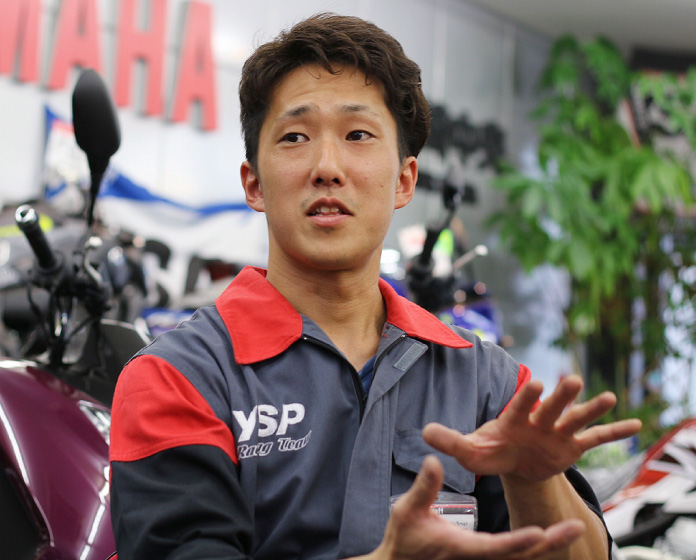
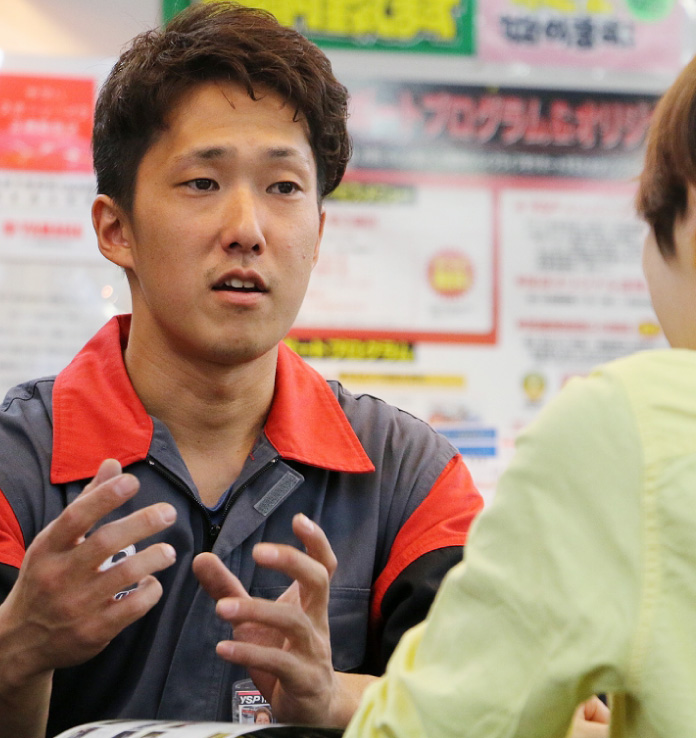
Message to Yamaha customers
The other day I had the chance to enter the pit at the Moto GP and look their pit work closely. I felt confident that technician in my shop was as good as anybody when it came to service skill. So when I asked why there weren't any Japanese technicians around, I was told that the Japanese technicians spoke poor English and so couldn't communicate with the riders…
Good communication between the rider and technician is not only important during races. There are technicians at the Yamaha authorized dealer who make every effort to meet customer expectations so when visiting a Yamaha dealer, don't forget to say hello to the technicians. We give 100% support to the value and experiences you get from riding your Yamaha!
